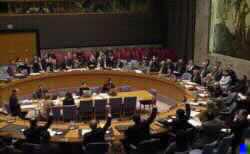The U.N. Security Council on Wednesday extended the U.N. oil-for-food humanitarian program in Iraq for six months and agreed to review within 30 days a list of goods that Baghdad needs approval to import. The council voted 15-0 after the United States dropped its demand for only a two-week extension at the insistence of the other 14 members. A nine-day renewal of the humanitarian program demanded by the Bush administration last week would have expired on Wednesday at midnight.
The program is usually renewed every six months but Washington had wanted another short extension so it could immediately add some 50 items to the list it believes Iraq could use for warfare.
"We must ensure the integrity of the export control program we have created and changes are needed on an urgent basis," U.S. Ambassador John Negroponte told reporters after the vote.
"The importance that my government attaches to this matter should not be underestimated," he said.
The controversy over the oil-for-food plan threatened to derail hard-won unity in the Security Council on Iraq since the adoption of a Nov. 8 resolution that gives Baghdad one more chance to disarm or face "serious consequences."
A French official praised Washington for listening to France, Russia and Britain and other members to preserve unity. She said that the vote meant ordinary Iraqis would not "be held hostage in any way" while the goods list was being negotiated.
Russian Ambassador Sergei Lavrov, who was the most vocal in opposing the original U.S. plan, said, "This is absolutely a victory for common sense and a victory for the Security Council and a victory for the Iraqi people."
The oil-for-food program allows Iraq, which has the world's second largest oil reserves, to sell unlimited quantities of oil, with revenues going into a U.N. account that pays vendors for goods that Iraq orders. It covers food, medicine and a host of civilian supplies to ease the impact of U.N. sanctions imposed after Iraq's 1990 invasion of Kuwait.
At issue this week was a U.N. roster of those goods the council must review separately before they can go to Iraq to make sure they have no military uses. The 300-page "goods review list," negotiated at length in May, is part of the oil-for-food program.
Among 50 items the United States wants on the review list so it can ban them is an antidote to nerve gas, which it fears could be used to protect Iraqi President Saddam Hussein's forces if he resorts to such weapons in a war.
The resolution adopted by the council "decides to consider necessary adjustments to the Goods Review List ... no later than 30 days from the adoption of this resolution and thereafter to conduct regular, thorough reviews."
The 180-day renewal extends the program to May 2, 2003.
Negroponte said it was imperative that Iraq could not take advantage of loopholes in the list "to acquire items that strengthen its conventional and weapons of mass destruction capability." But Washington, in the nine days the program was delayed, has not yet presented to the council a list of items it wants added. This was not completed until Tuesday.
Lavrov said the vote meant the program continued uninterrupted and all those who participate in the oil-for-food program had a predictable schedule ahead of them.
Iraq had bitterly criticized the U.S. delay as jeopardizing the humanitarian program.
But Baghdad's U.N. ambassador, Mohamed Aldouri, said he was fairly sure his government would accept the new U.S. proposal.
"This is not going to be a problem," he told Reuters. "Why did they not propose this from the beginning? I think yes, we would accept it."
Iraq has continued exporting oil through the current nine-day extension despite fears of a disruption to supply. Iraqi crude exports have been running at about 1.7 million barrels a day recently.
Reopening the list could be a Pandora's box. Russian Ambassador Sergei Lavrov has also proposed that several items, such as certain types of flatbed trucks, should be removed from the list, according to a paper distributed to council members.
Since the oil-for-food program began in December 1996, Iraq has imported DLRS. 25 billion in civilian supplies and oil industry equipment, with an additional DLRS. 10 billion in the pipeline.
Included on the U.S. list, at the behest of the Pentagon, are atropine, which can be used as an antidote to nerve gas, as well as global position system jammers, which could have a military use. Iraq recently ordered large quantities of atropine from suppliers in Turkey, raising fears Baghdad might intend to use nerve gas against any invading force
PHOTO CAPTION
The Security Council voted unanimously to extend the U.N. humanitarian program in Iraq for six months and review a list of goods that Bagdad needs approval to import within 30 days at the United Nations headquarters, New York, December 4, 2002 (AP Photo/Osamu Honda)
- Dec 04 8:02 PM
- Author:
& News Agencies - Section:
WORLD HEADLINES


 Home
Home Discover Islam
Discover Islam Quran Recitations
Quran Recitations Lectures
Lectures
 Fatwa
Fatwa Articles
Articles Fiqh
Fiqh E-Books
E-Books Boys & Girls
Boys & Girls  Hajj Rulings
Hajj Rulings Hajj Fatwas
Hajj Fatwas














